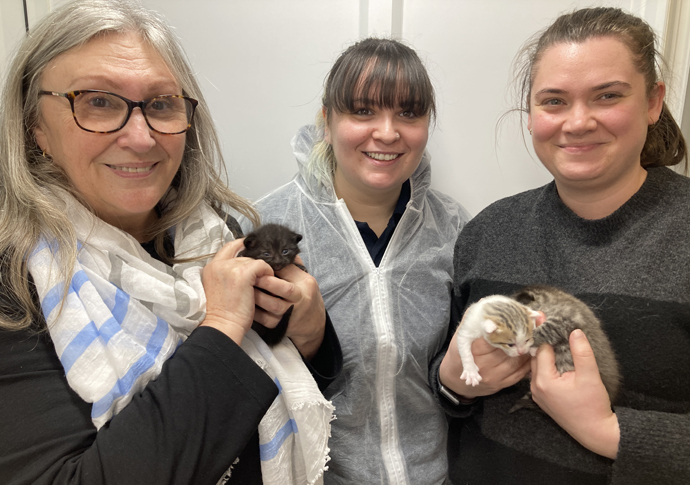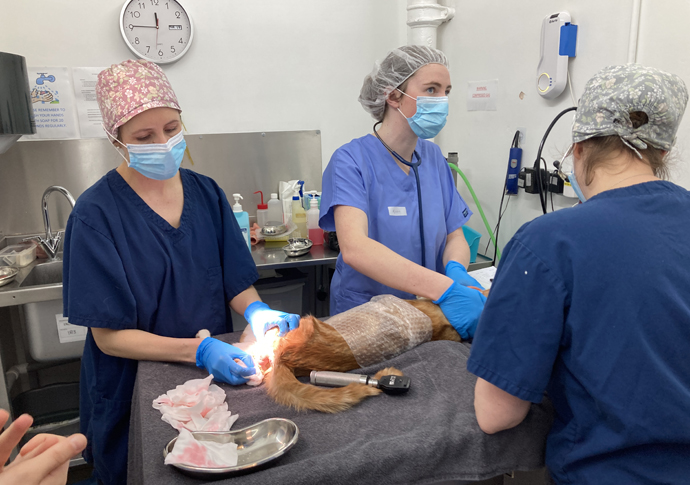Feline generous? RSPCA in search for cattery donors
‘Some days I just want to go home and cry – other days it’s the most rewarding job in the world’
Friday, 5th April 2024 — By Charlotte Chambers

Cattery manager Collette Jensen with colleagues Elle Hester and Denise Webb and kittens in their care
THEY take in more than 1,200 animals a year – mostly cats – and offer lifesaving care to abandoned and neglected pets.
And now the RSPCA Central London branch, based in Holloway, is asking for donors to help bring its cattery in Enfield up to scratch. The charity took on the cattery in 2017 when it ran out of money.
Collette Jensen, manager at the Holloway branch in Thane Villas, says the work they do is essential in caring for north London’s cats – including 60 neuterings a month to reduce the “over-population” of feline friends.
“Our mainstay here is neutering,” said the former civil servant, who discovered she was allergic to cats after she started at the centre in 2011. She now takes antihistamines to come to work.
“We neuter, neuter, neuter, neuter. Nothing leaves without being neutered because we don’t want any more cats.”
Only people enrolled on the London Cat Care & Control Consortium (C4) scheme, funded by Cats Protection and several other charities for owners on low incomes, can access neutering at the Holloway branch.
Others face between £150-£400 to neuter their cats at a veterinary surgery, while microchipping them, which will be a legal requirement by June, costs extra.
Ms Jensen warned that most animal homes had closed their waiting lists to take in unwanted cats, and had focused on rescuing those that were abandoned or unwell.

Vet Genevieve Smith with nurse Laura Wetherall neutering a cat
“All the charities are just overwhelmed,” she said. “Battersea closed their waiting lists last year. Cats Protection, same thing. RSPCA same thing.”
Feral colonies – where abandoned cats live outside and breed – along with “multi-cat households” are phenomena the RSPCA team at Holloway deal with. Despite cats being “singular” creatures, as Ms Jensen describes them, some can live in households of up to 35 felines in one small flat – often with no outside space.
The homes can quickly become overrun with excrement and cat flu, especially as cats are interbred, causing a range of genetic health problems. Some have to be put down as their health is so poor.
“It’s like hell in those flats. The noise and the smell. It just gets out of hand,” Ms Jensen said.
To help treat them, the Holloway branch has an air-management system which means illnesses cannot be passed between cats in their separate pens. But Enfield, where cats go once they’re ready to be rehomed, doesn’t have this. Last month, they launched a JustGiving campaign to raise £600,000 to rebuild the entire site, donated by someone in their will in the 1960s. The RSPCA Central London branch is exclusively funded through their nine charity shops across London – meaning they don’t get money from the RSPCA.
Explaining why people should consider donating, she said: “Some days I just want to go home and cry. And other days it’s the most rewarding job in the world because you’ve seen an animal go from something that comes in that’s really unwell and really sick. Nobody’s looked after it and it’s just so sad. Then you see that animal get better and better and better until it’s loving and it just wants a forever home. And then when you find the right home for it it’s just super amazing.”
To make a donation visit: https://www.justgiving.com/rspca-centralnortheastlondon/donate